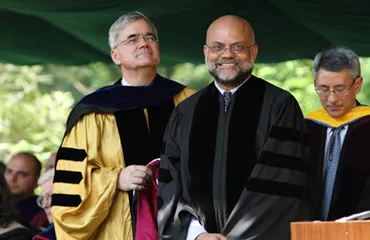President Chopp's Introduction of Iqbal Quadir '81

Iqbal Quadir, you are a world-famous entrepreneur, humanitarian, professor, and the founder and director of the Legatum Center for Development and Entrepreneurship at MIT. Your work combines the fields of globalization, technology, and civic service. Your radical vision of a way to provide universal access to telephone service in your native Bangladesh has facilitated economic development and enhanced community empowerment. You have used the tools of technology to raise human hopes around the world.
You graduated from Swarthmore in 1981 with a B.S. with honors in engineering and went on to earn an M.A. in applied economics at the Wharton School of the University of Pennsylvania in 1983. An M.B.A. in finance followed in 1987, the same year that your brother Tarik graduated from the College. In the 1980s, you worked at the World Bank, Coopers & Lybrand, and the Security Pacific Merchant Bank and were later named vice president of Atrium Capital Corporation. In the 1990s, you founded the New York–based company Gonofone and developed GrameenPhone, a project whose purpose was to provide access to telephone service in Bangladesh and create employment opportunities for its rural poor — in particular women — by building an electronic marketplace. You pioneered the idea of extending loans to women in rural villages to enable them to buy mobile handsets so they could sell calls to other villagers. They used their profits to pay for village health care and education and to develop other businesses. GrameenPhone is now Bangladesh's largest telephone company with an outreach to more than 25,000 villages and 100 million people. This model of using entrepreneurial rather than more traditional handouts to build businesses in underdeveloped areas has spread to Uganda and other parts of the world.
In 2001, you served as senior research associate of the Science, Technology, and Public Policy Program at Harvard's Belfer Center for Science and International Affairs. You went on to become a fellow and lecturer at Harvard's John F. Kennedy School of Government, where you concentrated on the impact of technologies and their democratizing effects within the politics and economics of developing countries. You were appointed a fellow of Harvard's Mossavar-Rahmani Center for Business and Government in 2002, where you taught courses on the effects of technology in developing countries. In 2007, you founded the Legatum Center for Development and Entrepreneurship at MIT, where you teach and serve as founding co-editor of the journal Innovations: Technology, Governance, Globalization. You also founded the Anwural Quadir foundation, named for your father, to promote innovations in Bangladesh, and Emergence BioEnergy Inc., a company that plans to provide reliable energy solutions for rural consumers in low-income countries in South Asia and Africa.
Your extraordinary work has been recognized with numerous awards, including the Global Leader for Tomorrow Award, and the Science, Education, and Economic Development Award. You have been featured on CNN and PBS and were profiled in Harvard Business Review, The Financial Times, The Economist, and The New York Times. In 2006, Muhammad Yunus won the Nobel Peace Prize for his work in "creating social and economic development from below," a project of the Grameen Bank, and it was your vision that provided the basis for that project.
Iqbal Quadir, you have been a model and an inspiration for those who seek to use technology to build an economic infrastructure in the underdeveloped countries of the world. You combine the knowledge of a scholar with the dedication of a teacher, the innovation of an entrepreneur with the heart of a humanitarian and from Bangladesh to Uganda have developed more than just new businesses opportunities; you have given communities a sense of common purpose and strengthened their belief that they can reshape their own lives.
Upon the recommendation of the faculty and by the power vested in me by the Board of Managers of Swarthmore College and the Commonwealth of Pennsylvania, I have the honor to bestow upon you the degree of Doctor of Humane Letters.



